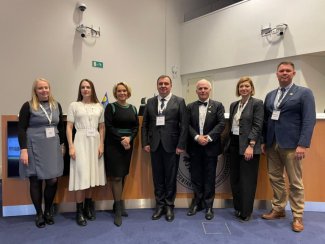Contact center of the Ukrainian Judiciary 044 207-35-46

The courts are coping with the challenges associated with the examination of criminal proceedings for war crimes. At the same time, a significant number of legal issues arise in the course of hearing the relevant cases, which require detailed analysis and discussion. These include, in particular, issues relating to the consideration of cases in absentia, the use of electronic evidence, ensuring the right of defence, etc. It is therefore necessary to study these issues in cooperation with international partners.
This was pointed out by the President of the Supreme Court, Stanislav Kravchenko, at the International Conference on Justice and Accountability for the War in Ukraine in Brussels, Belgium.
The Chief Justice delivered a speech at the panel discussion "Ukrainian Justice System in Combating Crimes against Humanity: Achievements, Challenges and Room for Improvement", outlining the general state of justice in Ukraine.
He also informed that as of 20 November 2023, the courts had already received 1,499 criminal proceedings on crimes of aggression and war crimes. Of these, 1,089 have already been reviewed by the courts of first instance, 64 have been reviewed on appeal and several more on cassation, which ensures the uniformity of case law in this category of cases.
Stanislav Kravchenko noted that the investigation mostly qualifies the unlawful actions of the military personnel of the Russian Federation under Article 438 of the Criminal Code of Ukraine, which provides for criminal liability for violation of the laws and customs of war. At the same time, this article is not easy to apply, given the blanket nature of its provisions, which require recourse to the Geneva Conventions.
Thus, this article contains a list of four elements of war crimes and the phrase "and other violations of the laws and customs of war". In essence, this provision refers to the entire body of norms of both international humanitarian law and international human rights law. This requires a thorough knowledge of international humanitarian law and international criminal law, so the judges are actively engaged in studying and analysing the relevant norms.
In addition, it was noted by Stanislav Kravchenko that a special trial procedure (in absentia) was employed in 75% of criminal cases under Article 438 of the Criminal Code of Ukraine. Taking into account international experience, in particular the case of the downing of flight MH17, and international standards for conducting criminal proceedings in absentia, the President of the Supreme Court believes that there is a clear need to improve Ukrainian legislation on the consideration of relevant proceedings in the absence of the accused.
Referring to the case law, the President of the Supreme Court outlined the range of evidence in criminal proceedings confirming the guilt of persons convicted of an offence under Article 438 of the Criminal Code of Ukraine, singling out electronic evidence. Stanislav Kravchenko noted that the use of electronic evidence has already been the subject of analysis within the framework of Council of Europe projects in Ukraine and that this work should be continued in the future, as this type of evidence can in many cases play a decisive role in proving a person's guilt.
The event was jointly organised by the Ukrainian Bar Association, the International Bar Association's Human Rights Institute and the International Bar Association.